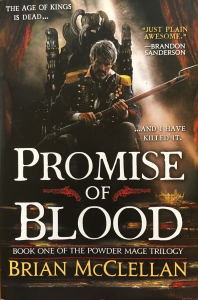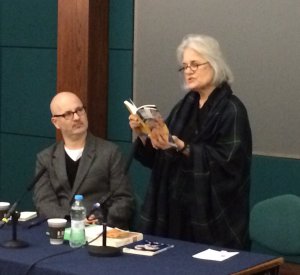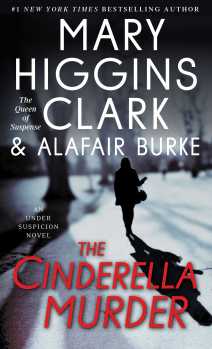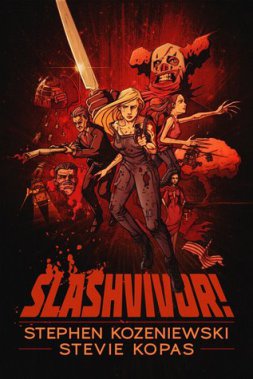
By: Brian McClellan
Publisher: Orbit
Published: April 16, 2013
Black powder and magic clash in a tale of rebellion and vengeance set in a world reminiscent of revolutionary France in Brian McClellan’s Promise Of Blood. This first installment of The Powder Mage Trilogy is gritty, action packed, and filled with intrigue. If you’re a fan of the fantasy genre and haven’t already picked this one up, run to your local bookstore (or online account) and get it. Trust me.
I’ll be honest, at first I was hesitant about a book with guns and magic. I haven’t read much of anything in the subgenre of black powder fantasy and I wasn’t sure if the two would blend well. I’d read a number of good reviews and the book had been recommended by some bloggers I trust so I gave it a try. I’m glad I did. Promise Of Blood falls somewhere between epic fantasy and heroic fantasy in my mind.
“It’s a bloody business, overthrowing a king. But amid the chaos, a whispered rumor is spreading. A rumor of a broken promise, omens of death, and the gods returning to walk the earth.”
Promise Of Blood opens with intrigue. The king of Adro has been deposed in a coup and his cabal of mages put to death. Tamas, the leader of the coup and Adro’s field marshal has summoned Adamat, a retired inspector to investigate a mysterious omen uttered by each mage before they died…”you can’t break Kresimir’s promise.” At the same time Tamas has assigned his son Taniel along with his mysterious “savage” tracker Ka’poel the task of hunting down a lone mage who escaped from the slaughter. These two storylines intertwine throughout the book as the characters delve into centuries old omens, religious doctrine, and legend; battle against royalists, internal traitors, and external armies; struggle with their past; and come to grips with the ultimate ramifications of overthrowing a king…ramifications that could lead not just to their own destruction, but the destruction of their whole country.
“The age of kings is dead…and I have killed it.”
The narrative is presented primarily through the lens of Tamas, Adamat, and Taniel, but if there is a single protagonist in Promise Of Blood it is Tamas. I didn’t do a page count to see how the chapters are split between the three, but everything in the story revolves around his decision to depose the king. The story stems from that event, and always comes back to it. Tamas initiates it and then continues to drive it forward through his ongoing decisions. But Tamas doesn’t steal the spotlight. The chapters from the perspective of Adamat and Taniel (and a few others) focus on their storyline, and explore and expand upon their unique characters while always pursuing the agenda set forth by Tamas and its repercussions.
It is that agenda, the coup and establishing a new government led by Tamas’ co-conspirators that drives the story. Beneath it all are a number of subplots that push and pull on the characters and their decisions – Tamas’ murdered wife, Taniel’s problem with addiction, and Adamat’s investigations to name a few…all add to the depth of the story. As the story moves forward and the various subplots play out the consequences of Tamas’ actions become more dire. The conspirators don’t just have to worry about remaining in power and fending off enemy nations, they also have to contend with the potential for gods to be summoned back to their world after centuries of absence bent on wiping them out.
When reviewing books I prefer to start with the things I disliked and end on a positive with what I liked…so…I only have a few minor complaints about Promise Of Blood. The first is that I can’t remember anyone ever using a ramrod! They are essential to loading a musket, especially a rifled musket. But nobody seemed to need one. Sometimes it’s the little details that matter to me.
The second is the occasional hero effect when it comes to weaponry. By this I mean the ease with which some characters handle their weapons, but I’m not talking about when they use magic to enhance their abilities. This happens in most fantasy literature but for some reason it got under my skin a little more here, I think because McClellan had done such a good job elsewhere with realism. Two scenes pop into my mind right now. The first is Taniel chasing a Privileged across city blocks and rooftops carrying his rifle and gear. It just seemed too easy given how cumbersome a musket really is. Those things weigh between 9 and 13 pounds, weighted differently at both ends, big and cumbersome. You can’t easily run with one strapped to your back or in your hands. Trust me you can’t. In the other scene Tamas takes a shot at an enemy with his pistol at 100 paces and didn’t need his sorcery for that. People today have a hard time doing that with a modern handgun but a smoothbore pistol? Smoothbore muskets (more accurate than a pistol) were only accurate up to about 80 yards. As a former Civil War re-enactor I am pretty familiar with these kinds of weapons and this bothered me a little. Kind of like the end scene in the 1992 Daniel Day Lewis version of Last Of The Mohicans when he’s running with a musket in each hand and manages to make a kill shot with each. No…just no.
The third thing that irked me a little was a few modern anachronisms that crept in. The one that comes to mind is, “Kresimir works in mysterious ways.” I know it’s hard to keep anachronism out of any writing, but in fantasy you’re trying to create a whole new world with it’s own set of anachronisms (which McClellan does do). So seeing these kind of just interrupts the flow of the narrative sometimes.
Now let me say NONE of the issues I mentioned above are major. I’m being nitpicky I know. They probably say more about me than the book. But I needed to get them out.
There is much to recommend in Promise Of Blood but in particular two things stood out. The first was the structure of magic in the world. There are varying gradations of magic that remind me a little of Brandon Sanderson’s Mistborn series. In Promise Of Blood there are three basic types of mage (though others are introduced these three are the basic core). The first are the Privileged. These are the closest to the typical magic user in fantasy. They cast spells using the Else and are noted by their rune covered white gloves. The power of the Privileged has waned over time as the second type of mage, the Marked have emerged.
The Marked, also called powder mages, have developed the ability to use magic through the aid of gunpowder they ingest typically by inhaling it. By doing so they gain enhanced abilities including strength and endurance, and the capability to “push” shots made with rifles or pistols giving the shot greater distance, penetrating power, or even the ability to change direction. They can also ignite nearby stores of powder for even greater feats. This power comes with a price, the potential for addiction and becoming poisoned by ingesting too much. Marked also have “the third eye” giving them the advantage of identifying Privileged and other magic through a special aura enhanced sight.
The third type of magic is that utilized by the Knacked. The Knacked typically have one enhanced ability such as not needing to sleep, or never forgetting details. Their abilities are not as powerful as those of the Privileged or Marked, but they are very useful when applied to a specific end.
This magic system offers one solution to a question that has long dogged fantasy literature – why doesn’t technology advance and if it does what would it look like? In The Powder Mage Trilogy technology has advanced to the point where weaponry has evolved to include pistols, rifles, and cannons, and the rudiments of industrialization are taking hold. In this world the ability to use magic has evolved with the technology and is most clearly seen in the rise of the powder mages.
The second noteworthy aspect of Promise Of Blood is its gritty detail. Battle scenes are painted with not just the sights of blood, gunpowder, and smoke, but their scent and taste as well (as someone who has tasted gunpowder I really appreciated this element). When characters are wounded they don’t immediately shrug it off and bounce back; bullets and swords pierce and cause lingering wounds that just don’t go away.
That detail carries over to the way characters are drawn. Tamas is a grizzled old veteran commander, tired and bogged down by his past and present. Taniel wants to make his father proud but pushes himself too far and has something of a drug problem – in this case his drug is gunpowder. These aren’t perfect characters. They have flaws and become limited by them. They make decisions influenced by these flaws that may impact everyone in their world. The most striking example is Tamas’ decision to instigate the coup – a decision influenced heavily by the murder of his wife; a decision that could mean the end for everyone.
I highly enjoyed Promise Of Blood. Intense action, Gritty detail, believable characters, an innovative magic system, and a plotline filled with intrigue lay the groundwork for what I hope is a fantastic series. McClellan has made me a fan of black powder fantasy and I want to read more.
4 of 5 Stars
Advertisements Share this:





